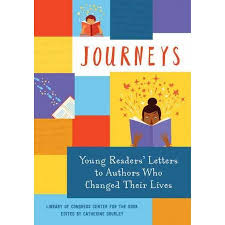 Gourley, Catherine, editor. Journeys: Young Readers’ Letters to Authors Who Changed Their Lives. Library of Congress Center for the Book/Candlewick, 2017. 240p. $18.99, ISBN 978-0-7636-8101-2, $9.99 (paper), ISBN 978-0-7636-9578-1.
Gourley, Catherine, editor. Journeys: Young Readers’ Letters to Authors Who Changed Their Lives. Library of Congress Center for the Book/Candlewick, 2017. 240p. $18.99, ISBN 978-0-7636-8101-2, $9.99 (paper), ISBN 978-0-7636-9578-1.
In 1984, the Center for the Book in the Library of Congress started a program called “Letters About Literature.” In 1992, it evolved into an annual letter-format essay contest co-sponsored by Weekly Reader. This collection of essays is made up of letters written to authors (living and dead) by young people, describing how a specific book from that author affected the reader’s life.
The collection begins with elementary school aged children, all independent readers who mainly focus on tween novels, although there are a few shorter books included. For example, one child tells Dr. Seuss that she has kept her copy of One Fish, Two Fish, Red Fish, Blue Fish because it reminds her of her mother who died from cancer. Another reader describes the layers of meaning in Shel Silverstein’s poem “Hug o’ War.” But most talk about the novels that impacted them, from Laura Ingalls Wilder’s The Long Winter, to Jerry Spinelli’s Stargirl.
Later chapters focus on middle schoolers, and then high schoolers, where many of the letters celebrate classics including works by Kipling, Tolkien, and Orwell. Contemporary classics are also included, such as Tan’s The Joy Luck Club. Award winners are also featured, including Lowry’s The Giver, and factual works like Frank’s Diary of a Young Girl. Each entry begins with a two or three paragraph introduction to the book, author, and the letter. These are very compelling, and motivate the reader to continue to the letter, intrigued by what was said about the book.
The letters are all well-written; in fact, many are quite thoughtful and personal without being maudlin. Each runs about three pages in length, so it is fun to dip into the book, looking at favorite books and then reading about new titles one may want to try. The letters almost serve as book talks and will inspire readers of this collection to seek out books to read. Middle and high school English teachers are a great audience for this, because they can use it to inspire a similar letter-writing assignment to celebrate books. Sharing the letters in class will motivate readers to try some new books instead of falling back on series reading as comfort food. Pass this along to the type of student who is already interested in books, and to teachers who can use it to motivate reluctant readers.
Penny Peck, San Jose State University iSchool
Leave a Reply